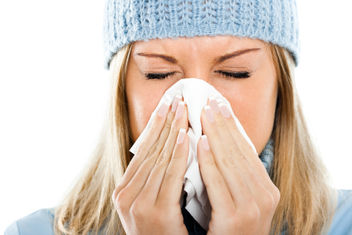Protect Yourself This Cold and Flu Season
October 19, 2020The fall and winter months are filled with fun activities, holidays and often a welcomed shift in the weather. However, with that shift in weather comes the dreaded cold and flu season. Don’t find yourself down for the count with the flu this year; and if you do, trust Inside Rx to get you up and running again.

The Inside Rx Blog
Get the Inside Scoop on tips & tricks that may help your family save on prescriptions!
Subscribe to stay up to date with the latest news and tips
What is the Flu?
Influenza, commonly known as the flu, is a contagious viral infection often resulting in high fever, body aches, sore throat, cough, runny nose and fatigue. While most people will recover from the flu, it can be fatal to certain vulnerable populations such as the elderly or those with pre-existing health conditions. Approximately eight percent of the population will contract the flu each season.
While the flu virus circulates year-round, the fall and winter months are commonly referred to as “flu season” in the U.S.. Peak activity is typically between December and February but can start as early as October and go as late as May. The flu virus spreads from person to person contact and can infect others up to about six-feet away. Once infected, most patients are contagious for the first three to four days, with some remaining contagious up to seven days following symptoms.
Prevention
Worried about getting sick this flu season? The CDC recommends getting the flu vaccine each year as the number one way to prevent seasonal flu. The shot is safe for everyone six month of age and older and is highly recommended for those in high-risk groups. In addition to receiving a vaccine, there are several steps you can take to protect yourself and those around you.
This flu season, take extra steps to avoid contact with people who are sick when possible. If you become sick, make every effort to stay home from work, school or errands to help prevent the spread to others. Covering your mouth and nose whenever you sneeze or cough can also help to prevent the virus from spreading by blocking the droplets containing the virus from reaching those around you. Wash your hands often to protect against germs and use an alcohol-based hand sanitizer when you’re unable to wash. You should also avoid touching your eyes, nose and mouth.
Finally, practice good general health habits by cleaning and disinfecting frequently touched surfaces. Stay hydrated, take a regular multivitamin or Vitamin C, get plenty of sleep and remain physically active.
I Got the Flu - Now What?
Sometimes even with preventative steps people can still contract the flu virus. If you find yourself with symptoms of the flu this season, go to your doctor to get tested right away and let them know you are experiencing symptoms of the flu. If you test positive, your doctor may prescribe a brand name medication such as Xofluza and Tamiflu or, Tamiflu's generic counterpart, oseltamivir phosphate. These may also be prescribed for preventative treatment in those who may have been exposed to the virus but have not yet become symptomatic.
In addition to prescription medication, be sure to stay home and rest. Over-the-counter drugs, such as Motrin and Tylenol, can be used to provide relief from symptoms like fever and muscle aches. Be sure to drink plenty of fluids. If you find that symptoms are continuing to worsen, contact your doctor as this can be a sign of flu complications.
Tamiflu
$ 161.49Oseltamivir Phosphate
$ 10.36How Inside Rx Can Help
Inside Rx is here for you this flu season with exclusive discounts that can possibly save you up to 80% on flu prevention and treatment methods at over 60,000 pharmacies nationwide. Go download your unique savings card and present it to your pharmacist when picking up a prescription for treatment. Inside Rx is not insurance, but it can help lower the cost of preventative and treatment prescription medications for those who are uninsured or under-insured.



